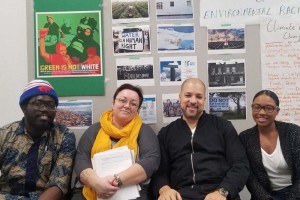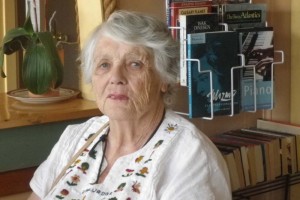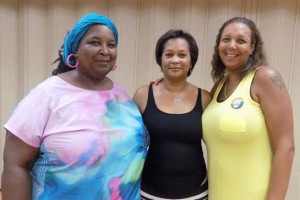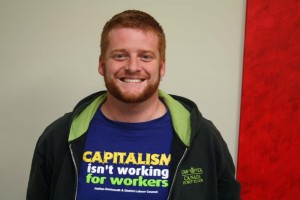"It was either activism or hockey, and I wasn't allowed to play hockey because I was a girl," laughs Tria Donaldson, 22, in a quiet Gastown pub. She's traveled six hours by Greyhound bus through avalanche country from Kamloops, B.C., to the coastal drizzle of Vancouver. The reason for her trip, which she makes each Friday afternoon, is "Next Up," a new leadership program for young people committed to social and environmental justice.
Next Up is a partnership between Check Your Head and the Canadian Centre for Policy Alternatives. Check Your Head is a not-for-profit that engages youth on issues connected to globalization by looking at the connection between global issues and local realities. The CCPA is a research institute focused on social and economic justice.
"The goal of the project is to get serious about supporting the next generation of social justice leaders," says Kevin Millsip, 38, director of Check Your Head and co-director of Next Up, along with CCPA director Seth Klein. "The right wing has been doing youth leadership training well for decades, and we have to get moving." After a pause, he muses, "If you're young and you're not in a union, what are your avenues for creating change?"
Next Up addresses this gap not only by exposing the participants, who range in age from 18 to 30, to an impressive array of innovative change-makers, but by connecting them with a mentor who can offer them anything from career insight to collaboration on a project. Guests this year have included NDP MLA Libby Davies, Vancity CEO and former B.C. Deputy Minister of Finance Tamara Vrooman, and Ken Novakowski and David Chudnovsky, both past presidents of the B.C. Teachers' Federation.
Each Next Up session begins with an invitation to tell a story. Leaders in diverse realms of the progressive movement are asked, "What's your story? How did you get to be here with us today, doing the work that you are doing?"
The participants in Next Up come with their own stories. Donaldson felt her first draw to social justice at an anti-free trade rally. "My dad was very involved with his union and I grew up with a strong presence of the labour movement in my family," she says. "I remember when I was young there was a rally during the resistance to NAFTA that my dad's union was a part of. We marched to Beacon Hill Park [in Victoria] and burned effigies of Harcourt and Mulroney. I didn't really even know what was going on, but the energy of the crowd moved me."
"I came from a family of lower socio-economic status," says Donaldson. "I started volunteering quite young because I wasn't happy. Volunteering kept me from falling through the cracks. I did everything I could to stay busy. The first thing I did was organize my elementary school's 'Greening of the School' project. We planted indigenous trees on school grounds.
"Lots of people I grew up with are on the streets or in jail now. Volunteering kept me tied to my community. I'm lucky enough to be where I'm at compared to people I grew up with. Now I want to give back."
Donaldson says she applied to Next Up because she thought it was very important to have someone with a rural and a First Nations perspective. "I'm very aware of representing both. It's a lot harder to organize in rural areas and it's these areas where we have the most work to do."
Since her early days planting outside her elementary school, Donaldson has acquired a formidable amount of experience in her years at Thompson Rivers University, in Kamloops. She has served as Aboriginal advocacy representative, two terms on the board of governors, and she is the current vice-chair of the environmental advisory committee.
Just like in her elementary school days as one of three children in the school who were not white, race and ethnicity have played a strong role in Donaldson's later years of organizing. "I am First Nations and East Indian, yet I have the rare opportunity to be seen as an insider," she says. "Most Aboriginal and marginalized people don't. Because of the positions I hold, or have held, because of my education, I can blend in. I can go to a city council meeting, I can get elected to student government. I bring different perspectives with me in those places. I have a door to the immigrant community through my grandmother. I have a door into First Nations' communities through my dad."
Like Donaldson, Kirsten Daub, age 30, comes from a family with ties to labour. "My parents were teachers, and strong believers in their union, the Ottawa-Carleton Elementary Teachers' Federation. They're the seed of my sense of social justice. They taught me that the world should be a fair place." When she was older, Daub traveled to Guatemala to learn Spanish. She says, "The people I met had lived through the 36-year war. After I'd known them for a while, they told me stories about their relatives who had been disappeared or tortured, and I really wanted to understand how that could have happened -- and, in some way, to contribute to making sure that it didn't happen again. I wanted to throw my hat in the ring."
Today Daub works for Cafe Etico, a fair-trade organic coffee company owned by Co-Development Canada, a B.C.-based non-profit working for social change, where Daub is also a program director. Her cafe job happens to be unionized, through Canadian Union of Public Employees Local 1004. "I started seeing all these amazing things that the unions involved with Co-Dev were doing. They were involved with international solidarity, working with workers -- not just in terms of giving money, but in really active ways, connecting with and learning from them. Next Up has given me a little push to get more involved in my union."
Daub, a coffee drinker, is enthusiastic about her job at Cafe Etico, saying, "Our coffee supports human rights, it respects union rights, and it respects labour's right, in Latin America, to a fair wage. It fits in with all the ideals that our unions are trying to promote, and we'd love to see more unions taking it on as their office coffee. And of course, it's really top-quality coffee. I always forget to mention that, because I drink it every day!"
Iglika Ivanova, who grew up in Bulgaria, began thinking about social justice while on scholarship at Lester B. Pearson College, an international school on Vancouver Island. Pearson College, says Ivanova, is where she was first exposed to social justice issues. "Growing up in Bulgaria during the Cold War, we were a Soviet satellite so there were no issues with social justice, because there was social justice. Emancipation of women had been established in the workforce; there was child care for everyone; everyone got paid roughly the same. I had never seen a homeless person. We only read that there were homeless people in America, sleeping under bridges. And in fact, we thought half the population of America slept under bridges, because of, you know, the Cold War [propaganda]. The other half slept in mansions!"
"Going to Pearson College changed my idea of what I wanted to do," says Ivanova. "Before that, I wanted to be a doctor, but I really got interested in economics and how it could explain what had happened in Eastern Europe, with the implementation of markets and why they weren't working when we'd thought they would. My economics teacher convinced me that being an economist is like being a doctor, except for countries and big communities." Later, while completing a Master of Economics degree at UBC (University of British Columbia), Ivanova again used economics to examine issues close to her experience.
"Because I was going to be an immigrant to Canada, I was interested in immigrant issues. I did a project on ethnic wage differentials for visible minorities, where I looked at visible minorities who were born in Canada, but still seemed to get paid less than white people with corresponding education and credentials.
These were the children of immigrants, who'd gone to school here and who speak English, who know the culture. So you couldn't say, 'Oh, they're immigrants so they don't speak English,' or 'They don't know about the culture.'"
Next Up participant Eloginy Tharmendran, 29, had an awakening during the FTAA protests in Quebec City in April 2001. "As much as I had questioned Canada as being a Land of the Free' before that time, that event shattered those ideals for me. Here we were in this country that's supposed to be an example of democracy, and I'm watching these riot police with their faces shielded from the people, inciting violence and attacking people for questioning ideas, for talking about democracy."
Tharmendran looks at her hands and shakes her head. "I thought, 'What gall to call other places backward when this is happening right here.'"
Tharmendran was born in Nigeria and raised in Sri Lanka and Nigeria until moving to Toronto when she was 11, and later to B.C. when she was 17. As a student at Simon Fraser University completing a General Studies degree in gender studies, Tharmendran has found that academia has played an important role in her sense of social justice and in framing her own experiences.
"When I first came to Canada, I noticed a lack of vocabulary to name the experiences I had here," she says. "Academics and friends offered some of that language, including critical race theory.' I relate to what Bell Hooks says, Finding rest in theory.'"
Women role models are instrumental for many of the Next Up women. Donaldson doesn't skip a beat when asked who her heroes are. "The Raging Grannies. I love them. I hope to be one some day."
Tharmendran says, "My grandmother always had an open-door policy. There where always women in the house. Even when they weren't welcome elsewhere in the community, they were welcome there. I heard a lot of stories in that time, women's stories. It was very important for me to know that my grandmother was a part of that."
For Tharmendran, the Next Up program represents a potential to include young people in sometimes inaccessible areas of the social change movements. "It's important for folks on the left to share information and stories with young people who may not be part of that lineage of change-makers. People have fought really hard for things like the eight-hour day, and I'm really appreciative of that work. I think it's really important to carry those stories forward and include folks marginalized within the youth movement. Also to look at what young people are doing and learn from the amazing work they are doing."
Daub agrees: "When you first start getting involved it can feel like a club. Next Up has really made it seem not like a club. It's very open. I feel like we're being drawn in to something that never was closed, but maybe seemed closed."
In this same vein of welcoming more young people into the movement, Next Up's participants are helping to organize two high school conferences, called "You Too." Interestingly, teachers from the high school where the first conference will occur had indicated that because many of their students are already working, the students would likely be eager to learn practical skills for job advancement. However, after surveying the students, it became clear that these young workers were just as keen to learn about global issues and what role they could play in making positive change.
Next Up encourages young leaders to explore the issues they are passionate about, and seek ways they want to make change in those areas. When Tharmendran looks to the future, the environment is one thing forefront in her mind. "I would like to see a reconfiguring of economics to reflect a true valuing of nature where it is not just for profit, but is respected for itself."
She laughs and throws up her arms, "I'm not talking utopia. I'm not saying it'll be tomorrow that we all walk down the street holding hands and singing, doves rising up, etc. But I would like to see lots of change. I think when we are able to receive each other with integrity it will all fall into place. I really believe that."
And the worst thing about Next Up? Donaldson says, with gusto, "The fucking Greyhound!"
Luisa Fisher was a Next Up participant.
Molly Lynes-Ford is program director for Check Your Head.














